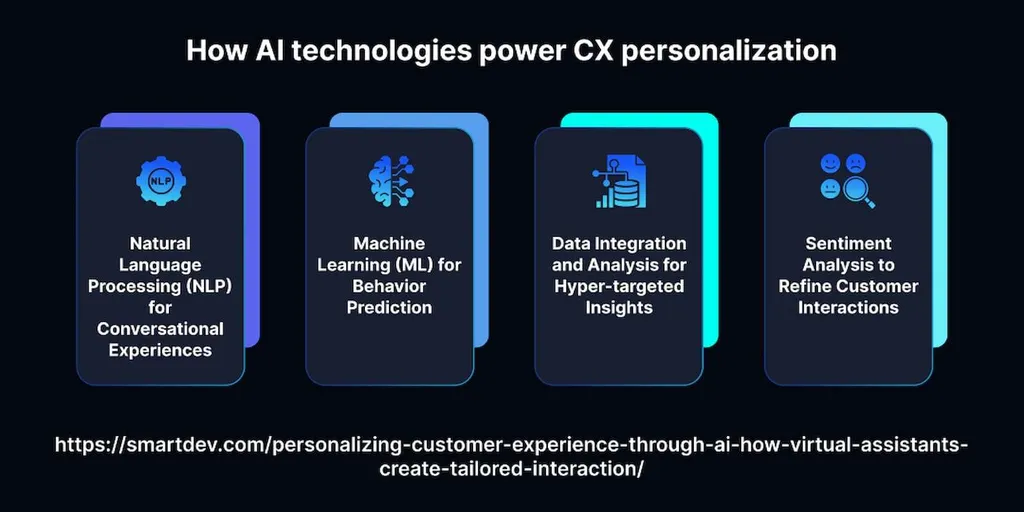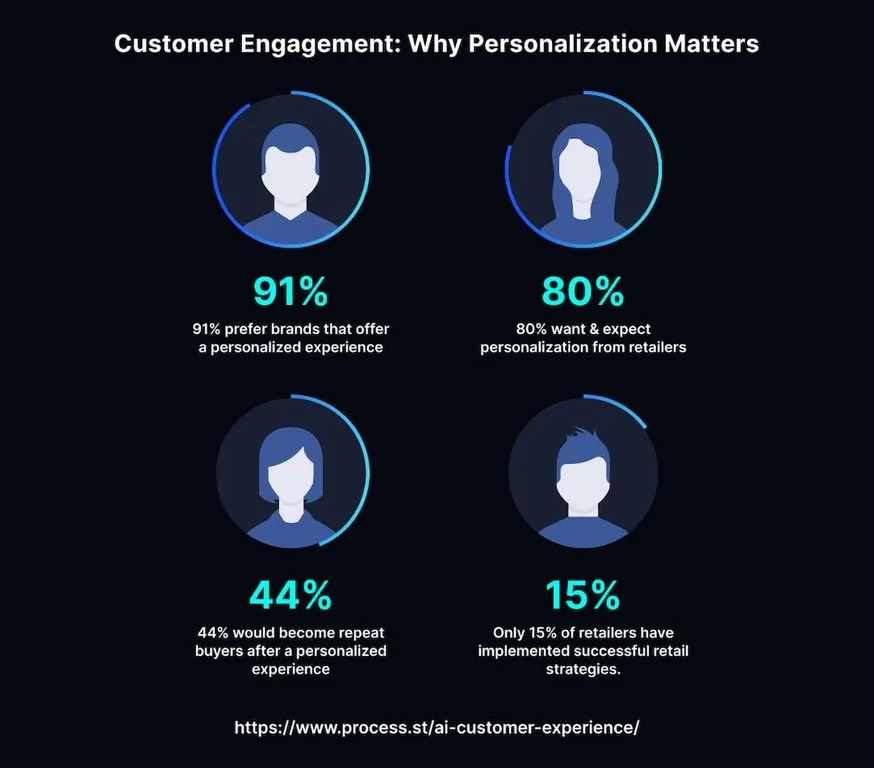Most clients enjoy a personalized customer experience (CX) when communicating with a brand and may easily become discouraged from using products or services if they feel that their particular needs weren’t fully met. Enterprises deploy AI to analyze consumer data, segment the audience, and target specific groups. This approach enables them to achieve sustainability and build a positive brand image. In this guide, we will explore the role of AI personalization in CX and examine a list of steps one should take to strengthen their bond with clients.
What Is AI Personalization?

The term refers to a set of practices that involves using data about the audience’s behaviors and demographics to learn more about the preferences of a particular person. Algorithms facilitate predicting which products one may be interested in and which channels they prefer to use for contacting a brand. Ventures collect information to discover how to streamline every step of a customer journey.
Increasing engagement requires significant investment. However, AI bots can keep consumers engaged by using the right channels, targeting messaging, choosing the right send times, and offering incentives.
In the eCommerce industry, many platforms create personalized recommendations using AI. Besides, brands consider the local climate to send specific offers and deals every season. AI-driven marketing campaigns enable brands to boost engagement levels, increase conversions, and boost revenues.
Hyper personalization permits companies to take a step further and customize marketing strategies, recommendations, and messaging for one specific client. Businesses use AI to collect all sorts of data about consumers. It enables them to tailor the content of their websites to the needs of a particular user and offer incentives that may interest a client.
The fastest-growing companies gain almost half of their revenue due to hyper-personalization. They know how to meet a person’s needs at a certain moment and address their concerns efficiently. It allows them to gain an edge over competitors and build lasting relationships with their audience.
Benefits of AI Personalization for CX

Companies seek to offer targeted services to ensure that customers’ needs are fully met. They use different approaches to show their clients that they care about their experience:
- Professional messaging. CS teams write empathetic emails and chat replies to build stronger ties with customers and reduce the average reply time. While some organizations are still reluctant to utilize AI, others consider it a source of their competitive advantage. Instead of following a simple script, a virtual assistant analyzes the history of past interactions, chooses the right tone of voice, and draws data from multiple sources to answer a request in full.
- Omnichannel support. The deployment of AI bots enables firms to save time and process queries across multiple channels without bloating the staff. Trained digital assistants perceive emotions, recognize intent, detect sentiment, and notice even the slightest signs of dissatisfaction.
- Targeted upselling. AI personalization marketing practices have demonstrated their high efficiency when it comes to suggestions. They can recommend a product bought by other customers with similar preferences. It increases the likelihood of a person purchasing a particular product. Personalized ads advertise products based on an individual’s search history.
- Dynamic site content. When a person visits an eCommerce website, they see products listed in a particular order, depending on their preferences and expectations.
- Improved in-person interactions. Firms rely on geo-location data and send personalized offers to buyers visiting a certain area. It allows them to motivate consumers to make spontaneous purchases. They also offer generous deals to loyal clients.
Agentic AI systems increase the efficiency of all processes. They facilitate upselling, provide buyers with high-value information, and streamline communication.
Why Rely on AI Personalization
Businesses improve their positions when they establish lasting relationships with their audience. Keeping track of individual clients is daunting, as it involves collecting a lot of data and making it accessible to CS agents. The introduction of AI simplified this task and enabled companies to achieve multiple objectives:
- Meet expectations. People want to order products from companies that know about their preferences and can quickly recommend the right product.
- Increase revenues. Individuals are ready to pay more for augmented experiences. Powerful recommendation engines help businesses leverage AI to provide buyers with the best offers. The investments in personalization software continue to grow, so firms that are slow to use such technologies may find it impossible to catch up in a few years. Businesses need to remain agile to boost their revenues.
- Target ads to improve sales. Traditional marketing practices no longer work as they did before. One should understand their buyers better to surpass their expectations. AI makes targeting efforts more result-yielding. Consumers are more likely to open personalized emails. Besides, they often follow recommendation links if they are interested in the advertised products. Firms increase the possibility of purchase by making their campaigns more tailored to individual preferences. It improves client satisfaction and engagement.
While building and integrating custom LLMs requires a significant investment and high expertise, such solutions deliver high value in the long term.
Examples of AI Personalization
Algorithm-driven systems enable organizations to handle large volumes of data, avoid mistakes associated with manual input, and provide quick replies. Below, we have examined how AI personalization has transformed several industries and helped companies provide better CX.
Ecommerce
Firms implement AI across all client touchpoints. They deploy chatbots, integrate analytics tools, gather information about buyers’ preferences, and offer targeted suggestions. It allows them to serve buyers better and ensure their needs are fully met.
Hospitality
The integration of AI-driven telephony systems enables ventures to make their CS services available 24/7. Chatbots process reservations and answer queries. Brands also utilize AI to recommend similar dining experiences via emails, messages, and apps. Dynamic pricing helps firms maintain flexibility and automate the process of adjusting prices. Besides, it ensures that more rooms get booked.
Healthcare
Healthcare providers have already implemented multiple AI solutions to improve CX. Algorithms facilitate diagnostics and allow professionals to provide efficient treatment recommendations. AI software streamlines health monitoring and allows organizations to increase patient engagement. Personalized services improve health outcomes. Individuals who use them adhere to their treatment plans better. However, companies should take steps to avoid AI-related bias and address security concerns. They need to implement extra measures to protect patient data.
Retail
AI-powered avatars allow customers to see whether a specific clothing item fits them. Clients rely on AI-generated outfit recommendations when creating their look. Those who want to decorate their homes can use AI to visualize how colored walls will look. Besides, they utilize AI tools to choose the right furniture pieces to decorate their interiors. Applications with augmented reality features allow individuals to see how a particular item will look within an interior. It makes it easier to make the best choice when buying products.
How to Use AI Personalization to Augment CX
Ventures implement AI to handle an increasing volume of queries without delays, establish better relationships with clients, and improve the efficiency of CS teams. Follow these steps to utilize algorithms:
- Find the right AI-driven software for your needs. Each industry has specific requirements. The deployment of an advanced AI engine capable of processing a lot of data and improving its performance. It should support ML technology to help the CS managers access detailed information about consumers and provide personalized services. Powerful AI systems require a significant investment, but they deliver high value in the long term.
- Integrate AI software with the tools your teams already use. It will streamline onboarding and enable agents to master new features quickly. An AI system will help them access the scripts they need in real time and use sentiment analysis tools to understand a person’s feelings better.
- Adjust your strategies. When you collect more data about your audience, fine-tune your tools and change scripts to solve problems faster and ensure higher satisfaction.
AI personalization lets firms reduce workload for agents and simplify their workflows. It empowers them to establish a deeper connection with consumers. Metadialog develops custom LLMs for businesses of all sizes, helping them reduce average response times and automate up to 81% of chat conversations. Its advanced software lets ventures minimize customer friction and allows frontline agents to augment client experiences. Get in touch with the team of experts to make your business more profitable.
